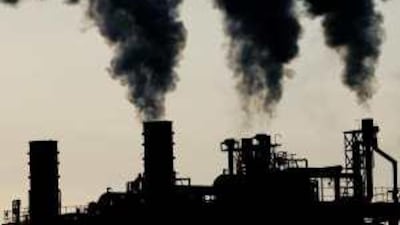The UAE and other oil producers need to recognise that new greenhouse gas limits could herald the end of the hydrocarbon era, even though technology may still offer a solution, experts at a climate change conference in the capital said yesterday. World leaders will meet in Copenhagen in December to form a new agreement to limit emissions of carbon dioxide and other greenhouse gases. That agreement will replace the Kyoto Protocol, which is due to expire in 2012.
Officials in Saudi Arabia, among others, have complained that new regulations will reduce demand for oil, potentially wreaking havoc on their economy. Tom Heller, a climate-change expert and professor at Stanford Law School in California, said regional oil producers had cause to be nervous but still had the time and resources to plan for post-oil economies. "They're the natural losers in this thing. The question is, what is the path of decline?" Mr Heller said on the sidelines of the conference, which was hosted by New York University and the Emirates Centre for Strategic Studies and Research. "If they plan carefully, they can use that resource as a base for new wealth."
Countries in the region would be hurt by new regulations on three fronts: new penalties on emissions from gas and oil in industrialised countries would reduce demand for their principal export; limits on emissions would be harder to achieve here because production of oil and gas emits high levels of carbon dioxide; and the high levels of energy inefficiency in the region would make it especially difficult to reduce energy consumption.
But even with strict regulations, most projections show oil production from Iraq, Iran and the GCC increasing in the next 20 years as smaller reserves in non-OPEC countries are depleted. With the lowest production costs in the world, countries in the region are expected to be among the last to stop producing crude as consumption of oil declines. Mr Heller estimated that Gulf producers had between 50 and 60 years left of steady income from oil, which they could use to develop the infrastructure for a new economy.
Abu Dhabi has invested billions into renewable energy through Masdar, the Abu Dhabi Future Energy Company, while also pursuing plans to expand oil production capacity to remain a leading supplier of hydrocarbons to the world economy. Oil and gas and renewable energy are not mutually exclusive, said Sam Nader, the head of Masdar's Carbon Management Unit. "The UAE is a unique example," Mr Nader said. "The UAE, being a leader in conventional energy, wants to keep that position."
Any new agreement will have to give each country the flexibility to adapt emissions limits to their own national circumstances, he said. Oil producers and international oil companies are looking to develop technology that will allow consumers to burn oil and gas without contributing to global warming. Masdar is investing billions of dollars to develop the world's first carbon capture and storage (CCS) network that will divert 6.5 million tonnes of carbon dioxide from industrial sites for permanent storage in ageing oil reservoirs.
Developing cost-effective CCS systems should be a priority for all the countries surrounding the Gulf, said Narsi Ghorban, the managing director of Narkangan Gas to Liquid International, which is developing a small CCS project in Iran. "The amount of carbon dioxide around here is huge," Mr Ghorban said. "Everybody will be affected by the same problem." cstanton@thenational.ae

